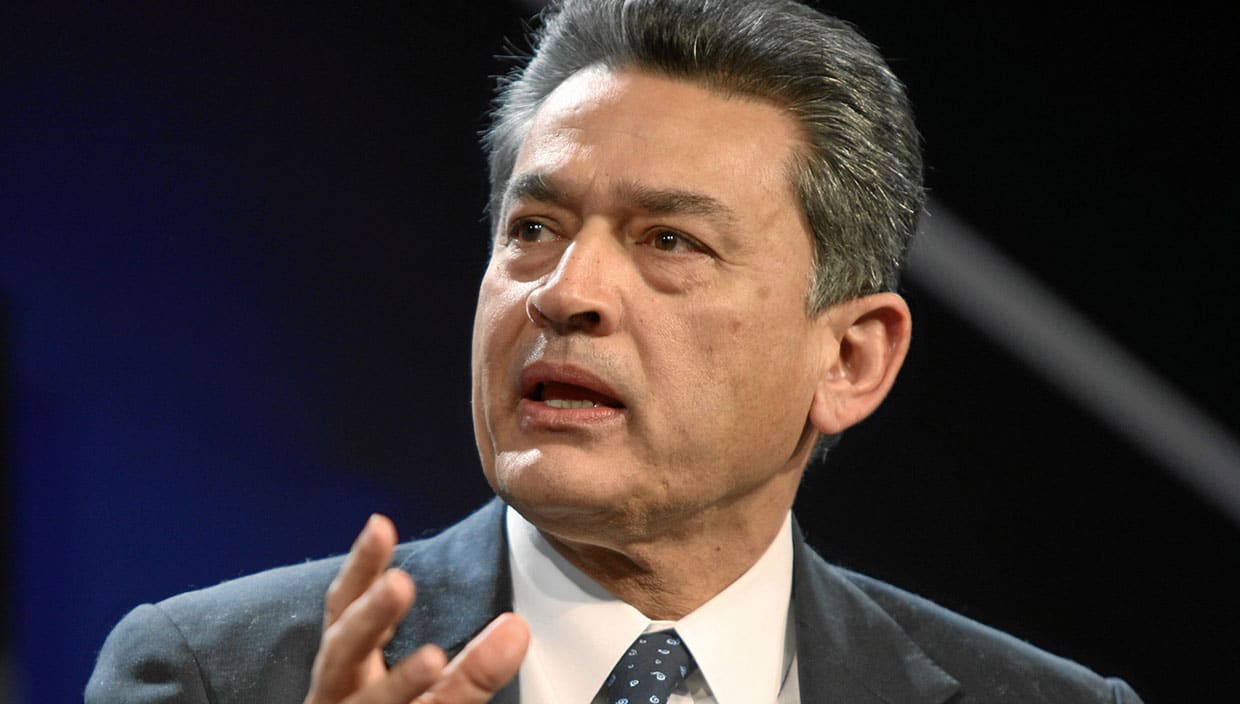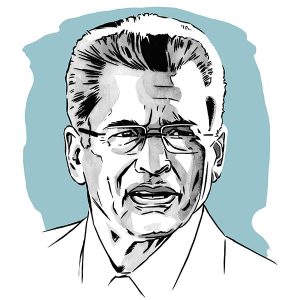Business
Rajat Gupta’s Road to Rehabilitation

Out of Prison, Former Goldman CEO Finds Returning Is a Hard Road
One June evening last year, some of New York’s most prominent Indian-Americans gathered at a gated house in Rye, New York.
A few dozen Indian-American businessmen and their bejeweled wives, some decked out in colorful salwar kameezes, had arrived at the home of Ajit Jain, a top executive at Warren E. Buffett’s company, Berkshire Hathaway, say people who were invited to the dinner. They were there to welcome back an old friend, Rajat K. Gupta.
Only two months before, Gupta had finished a two-year prison sentence for divulging corporate secrets to Raj Rajaratnam, the hedge fund titan now serving the longest sentence ever for insider trading.
At this dinner were many who had known Gupta for years. Among them were Toos Daruvala, currently the co-chief of McKinsey’s investment office, and Ravi Trehan, an investor with whom Gupta had teamed up more than a decade ago.
There were notable absences, too. Indra K. Nooyi, the chief executive of PepsiCo, was invited but declined to attend. So too did Dinesh Paliwal, the head of Harman International. Even Jain’s cousin, Anshu Jain, the former co-chief executive of Deutsche Bank and now president of the brokerage firm Cantor Fitzgerald, passed on the evening.
(All those named above declined to comment or did not respond to a request for comment.)
Still, to those invited, Gupta’s presence at a dinner given by an executive of Jain’s stature was a sign that he was to be embraced by the pantheon of Indian business leaders in the United States.
It was a striking show of support, especially as Gupta had been convicted four years earlier of tipping off Rajaratnam to a crucial 2008 investment in Goldman Sachs made by Berkshire Hathaway. Gupta was a director on the board of Goldman Sachs when Buffett poured $5 billion into the firm at the height of the financial crisis.
Gupta, the former global head of consulting giant McKinsey & Co., became a pariah among many of the corporate chieftains who once craved his counsel. Now 68, he has been trying to restore his reputation and rebuild his fortune since being released from a federal prison medical center in Devens, Massachusetts.
But he has struggled to reconnect with many former associates and clients in the United States.
His ties to India’s business community, and its diaspora of executives in the United States, have proved more durable. Many of them, like Ajit Jain, go back many years. Both Jain and Gupta were graduates of India’s famed breeding ground for chief executives, the Indian Institute of Technology, and they had been close friends during their rise up their respective corporate ladders.
While the friendships within the Indian community were forged decades ago and were rooted in kinship, Gupta’s relationships with non-Indian business leaders were usually newer and often driven by commercial considerations. When the commercial promise was shattered, the relationship broke down.

Credit:Joel Benjamin/New York Times
“The system in America had a stake in Rajat Gupta,” said Suhel Seth, the founder of the Delhi-based brand marketing firm Counselage. “There was a greater investment of respect and trust in the man, so they were the ones who felt a sense of deep betrayal.” By contrast, he noted, “the people who welcomed him with open arms in India had benefited more from him than he from them.”
During Gupta’s heyday, he was a sought-after board member and a regular attendee at gilded events like the World Economic Forum’s annual meeting in Davos, Switzerland.
Now, Gupta cannot get his former firm, McKinsey, which he led for nine years, to even acknowledge him.
A few months ago, Herbert Henzler, a former colleague of Gupta’s at McKinsey, pushed to have Gupta invited to the triennial meeting in Boston in June of the firm’s retired and former senior partners. Gupta was not invited.
Gupta also failed in his effort to be reinstated in the McKinsey alumni directory. When criminal charges were first filed against the McKinsey senior partner Anil Kumar and later against Gupta, McKinsey moved to remove both names from the register.
McKinsey declined to comment. Gupta also declined to comment for this article.
The rebuffs by McKinsey have rankled him, friends say. He is upset that the firm at which he spent almost his entire career will not even acknowledge him as an alumnus — a fact that his incarceration has not altered.
Since his release from prison, Gupta has been providing consulting services, mostly in India, for Purnendu C. Chatterjee, a wealthy entrepreneur who knows Gupta from their early days at McKinsey when there were few South Asians at the firm. Gupta has also been embracing some of the charitable and educational causes he once promoted.
When Analjit Singh, the founder of Max Group, a diversified Indian conglomerate focused on health care and insurance, learned late last year that Gupta was coming to India, he held a party for him at his home near Delhi’s fashionable Golf Links area.
“I don’t know of any other Indian — underscore any — who has done more for India than he has,” Singh said recently, in explaining the affection Indians hold toward Gupta.
Seth of Counselage, who was invited to the party, said that when he told Gupta that he had dented India’s brand, Gupta did not argue with that assessment.
Perhaps that explains the reason some Indians are keen to help Gupta’s public rehabilitation. And none may be keener than Indian-Americans.
In June, Gupta and his longtime friend Deepak Chopra were invited to address the second annual IIT Bay Area Leadership conference at the Santa Clara convention center in California.
Even though the event was billed as an opportunity for the two “pioneers in the business community” to discuss “their paths to success,” Gupta, an alumnus of IIT Delhi, devoted his remarks to speaking about the “extraordinary last six years.”
“While I continue to fight the injustice in my case, I have to candidly admit that I made errors and misjudgments, and for that I take full responsibility,” he told an audience of about 1,000 people.
He detailed a number of the great institutions — the IITs, the Harvard Business School, McKinsey, among others — where he had the privilege to work. He noticeably omitted Goldman Sachs, a firm he privately blames for actively helping government prosecutors build their case against him.
Goldman too was angry at Gupta for dragging its name into insider trading headlines. But under its policies, Goldman had to foot the legal tab for Gupta’s defense.
As part of a 2015 settlement, Goldman’s insurer has agreed to cover nearly $42 million of Gupta’s legal expenses even though he was convicted.
Under the settlement, Gupta has agreed to waive any future claims against Goldman or the insurer, suggesting that he is personally funding his recent efforts to expunge his conviction. Gupta is awaiting a decision from the 2nd U.S. Circuit Court of Appeals, which last year agreed to review his conviction.
Goldman declined to comment.
Speaking this spring at the Young Indians national annual summit meeting in Delhi, which was hosted by the Confederation of Indian Industry, Gupta was bitter about his experience with the U.S. justice system.
He said he got “caught in the cross hairs between a very politically ambitious prosecutor” and “a judicial system and a system of juries that don’t really understand necessarily sophisticated financial crimes.” He blamed his legal troubles on being “fundamentally trusting of everybody.”
Though he did not offer details on his time in prison, Gupta, an avid bridge player, told friends in a letter in 2016 that he learned card games like spades in prison, discovered the art of poetry writing and even reignited his passion for chess after a long hiatus.
At the IIT Bay Area conference, his tone had mellowed a bit.
“During this time, I saw the underbelly of our justice system, endured imprisonment and eight weeks of solitary confinement but very importantly got to know who my real friends are,” Gupta told the gathering.
One of his greatest regrets, he said, is that he did let down young people who were part of the institutions he worked with.
“I want to apologize to all of you IIT alumni that I really did not live up to the highest standards that you would have likely expected me to do,” he said. “I genuinely ask for your forgiveness and understanding.”
The audience clapped, but after the panel was over, only a few attendees approached him, say two people in attendance. It was a very different scene from a decade ago when Gupta would be mobbed at events like these by aspiring young Indians.
This article is republished from the New York Times.

You must be logged in to post a comment Login